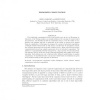Free Online Productivity Tools
i2Speak
i2Symbol
i2OCR
iTex2Img
iWeb2Print
iWeb2Shot
i2Type
iPdf2Split
iPdf2Merge
i2Bopomofo
i2Arabic
i2Style
i2Image
i2PDF
iLatex2Rtf
Sci2ools
PPL
2007
2007
Embodied Computation
The traditional computational devices and models, such as the von Neumann architecture or the Turing machine, are strongly influenced by concepts of central control and perfection. The standard models of computation seem to cover the reality of computation only partially and lack, in particular, in the ability to describe more natural forms of computation. In this paper we propose the concept of embodied computation, a straight forward advancement of well known concepts such as amorphous computing, emergent phenomena and embodied cognitive science. Many embodied microscopic computational devices form a single macroscopic device of embodied computation. The solution to computational problems emerges from a huge amount of local interactions. The system’s memory is the sum of the positional information and possibly of the internal states. Such systems are very robust and allow different methodologies to analyze computation. To back this theoretic concept some results based on simulat...
Related Content
| Added | 27 Dec 2010 |
| Updated | 27 Dec 2010 |
| Type | Journal |
| Year | 2007 |
| Where | PPL |
| Authors | Heiko Hamann, Heinz Wörn |
Comments (0)

